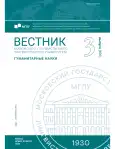Речеактовая специфика гармонизации коммуникации в дискурсе социальной работы
- Авторы: Бредихина Ю.И.1
-
Учреждения:
- Ставропольский государственный педагогический институт
- Выпуск: № 3(897) (2025)
- Страницы: 48-55
- Раздел: Языкознание
- URL: https://journal-vniispk.ru/2542-2197/article/view/286472
- ID: 286472
Цитировать
Аннотация
Стратегия гармонизации некооперативного коммуникативного взаимодействия является ключевым условием достижения дуальных целей пограничного дискурса социальной работы. Целью настоящего исследования является рассмотрение речеактовой специфики уровней коммуникативного действия в некооперативном дискурсе социальной работы. На основании интеракционального и дискурсивно-модусного анализа микроконтекстов, репрезентирующих взаимодействие агентов и клиентов социальных служб, определяются наиболее эффективные формы локуции. С их помощью транслируются частные и целецентрические гармонизирующие иллокуции. В качестве частотных и обладающих максимальным потенциалом консолидации коммуникативных усилий признаются: ассертивы, комиссивы, квеситивы, промисивы, перформативы, декларативы, апеллятивы, метакоммуникативные фатические маркеры.
Об авторах
Юлия Игоревна Бредихина
Ставропольский государственный педагогический институт
Автор, ответственный за переписку.
Email: bredichinajulia@yandex.ru
магистр лингвистики, аспирант кафедры русского, родных языков и лингводидактики
РоссияСписок литературы
- Дейк ван Т. А. Язык познание коммуникация. М.: РИО БГК имени И. А. Бодуэна дэ Куртенэ, 2000.
- Гойхман О. Я., Надеина Т. М. Речевая коммуникация. М.: ИНФА-М, 2003.
- Алферов А. В. [и др.] Интеракциональная когнитивная семиотика: понятийные составляющие метода (интерпретанта, релевантность, ad hoc-концепты) / А. В. Алферов, Е. Ю. Кустова, Г. Е. Попова, И. Г. Тамразова // Вестник Пятигорского государственного университета. 2020. № 3. С. 30–36.
- Бубнова Г. И. Лингвокогнитивный анализ научного текста: гибридизация под воздействием многоканального порождения // Вестник Московского государственного лингвистического университета. Гуманитарные науки. 2024. Вып. 13 (894). С. 23–30.
- Попова Т. П. Характеристики институционального дискурса // Историческая и социально-образовательная мысль. 2015. T. 7. № 6 (2). С. 295–301.
- Карасик В. И. Языковый круг: личность, концепты, дискурс. Волгоград: Перемена, 2002.
- Фуко М. Воля к истине: по ту сторону знания, власти и сексуальности. М.: Касталь, 1996.
- Остин Дж. Три способа как пролить чернила. Философские работы. М.: Алетейя, 2006.
- СёрлДж. Р. Что такое речевой акт // Новое в зарубежной лингвистике. 1986. Вып. 17. С. 151–194.
- Бредихина Ю. И. Антропоцентрические и когнио-коммуникативные основания делимитации релевантности и пертинентности в дискурсе социальной работы // Вестник Ставропольского государственного педагогического института. 2023. № 2 (20). С. 28–37.
- Бредихин С. Н. Теория некооперативных игр в порождении и интерпретации высказываний институционального дискурса // Профессиональная коммуникация: актуальные вопросы лингвистики и методики. 2023. № 16. С. 50–58.
- Гусейнова И. А., Горожанов А. И. Реализация концепции «диалога на равных» в вузе // Вестник Московского государственного лингвистического университета. Образование и педагогические науки. 2024. № 3 (852). С. 17–23.
- Кунцевич С. Е. Психологические аспекты политического дискурса // Вестник Минского государственного лингвистического университета. Серия 1. Филология. 2005. № 4 (20). С. 37–50.
- Бредихина Ю. И. Способы управления институциональным дискурсом посредством внедрения паралингвистических и экстралингвистических приемов невербальной коммуникации // Изоморфные и алломорфные признаки языковых систем. Ставрополь: Изд-во СКФУ, 2024. С. 41–47.
Дополнительные файлы











